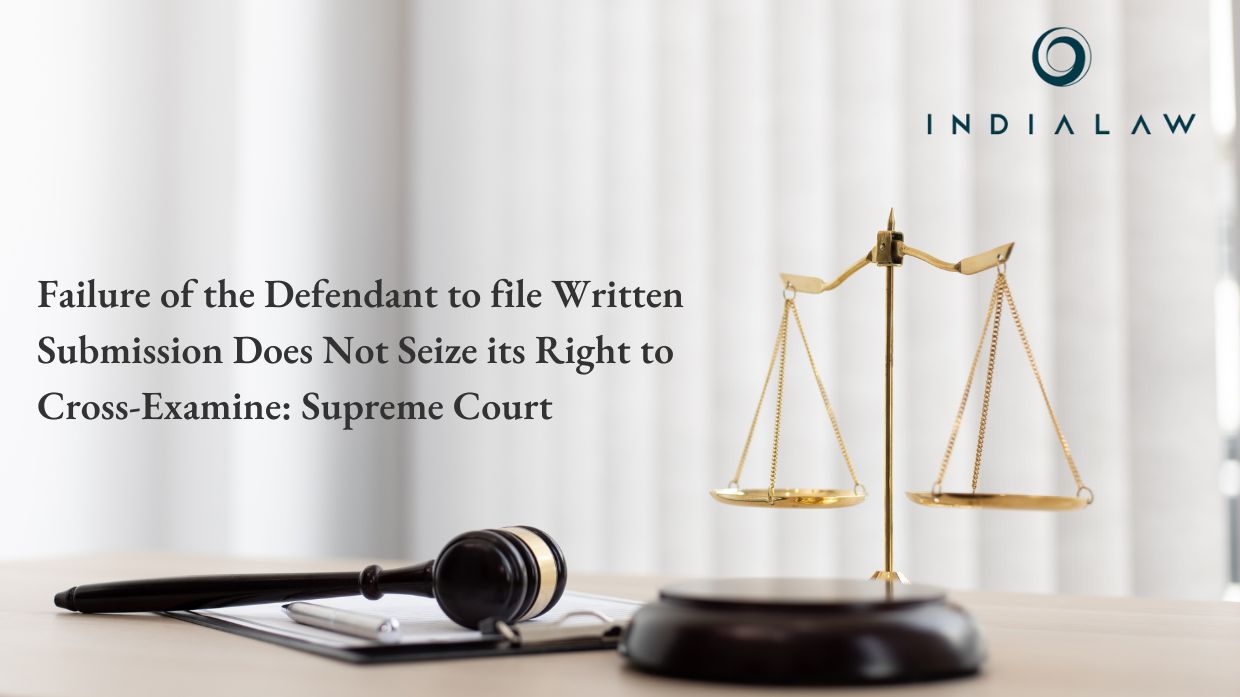Failure of the Defendant to file Written Statement Does Not Seize its Right to Cross-Examine: Supreme Court

The Hon’ble Supreme Court (“SC”) recently delivered a noteworthy judgment in the case of Ranjit Singh & Anr. v. State of Uttarakhand & Ors.[i], addressing significant concern over an ex parte proceeding and the striking out of a Defendant’s defence.
Backdrop of the case:
The Appellants, Ranjit Singh and another, were Defendants in a suit filed by the first Respondent and the late Shanti Devi for possession of a property, with allegations that the State of Uttarakhand (first Respondent) was a tenant paying a monthly rent, fixed by the Court in May 1999. The Plaintiffs contended that the Defendants failed to pay rent despite a notice of termination under Section 106 of the Transfer of Property Act, 1882[ii], leading to the suit’s initiation.
Proceedings before the Ld. Trial Court:
Thereafter, the Defendants’ on multiple occasions requested adjournments to file its written statement, the Ld. Trial Court subsequently proceeded ex parte with the suit. As a result of which, the Ld. Trial Court struck out the Defendants’ defense without providing them an opportunity to be heard. The aforesaid decision was made despite a previously scheduled hearing, indicating a breach of natural justice principles.
The Defendants subsequently filed applications to set aside the ex parte order and the order wherein the right to defend was struck off by the Ld. Trial Court. However, the aforesaid applications were rejected, leading to the eventual ex parte decree being passed by the Ld. Trial Court in the suit.
Analysis by the Hon’ble Supreme Court:
In the present case, the SC categorically stated that striking out a Defendant’s defence without giving an opportunity of hearing, contravenes the essential tenets of justice. The SC, while emphasizing the importance of providing Defendants with a fair opportunity to defend themselves, ruled that the Ld. Trial Court’s actions of proceeding without notice were fundamentally flawed. It articulated that a Defendant retains certain rights, even when a suit is conducted ex parte, including the right to cross-examine witnesses and argue points based on the Plaintiff’s evidence.
Firstly, upon the perusal of the facts and circumstances, the SC noted that, the Ld. Trial Court’s actions were found to be illegal, as it proceeded without giving the Defendants proper notice or an opportunity to be heard. These contravened fundamental principles of natural justice. Secondly, the SC noted that despite the striking out of a defense, Defendants have certain rights, such as the right to cross-examine the witnesses presented by the Plaintiff and to contend that the suit is barred by applicable laws, such as the law of limitation. Thirdly, the SC, highlighted the significance of adhering to procedural fairness, asserting that the lack of notice and opportunity for the Defendants to present their side, constituted a grave miscarriage of justice.
Author’s Opinion:
In the author’s opinion, the present case reinforces the significance of principles of natural justice, by ensuring that all parties have a fair opportunity to present their case. The SC, ascertained that the Defendants retains the right to cross-examine a Plaintiff’s witnesses, even in ex parte proceedings where a written statement has not been filed.
[i] Civil Appeal No.2394/2023.
[ii] 106. Duration of certain leases in absence of written contract or local usage.– (1) In the absence of a contract or local law or usage to the contrary, a lease of immovable property for agricultural or manufacturing purposes shall be deemed to be a lease from year to year, terminable, on the part of either lessor or lessee, by six months’ notice; and a lease of immovable property for any other purpose shall be deemed to be a lease from month to month, terminable, on the part of either lessor or lessee, by fifteen days’ notice.
(2) Notwithstanding anything contained in any other law for the time being in force, the period mentioned in sub-section (1) shall commence from the date of receipt of notice.
(3) A notice under sub-section (1) shall not be deemed to be invalid merely because the period mentioned therein falls short of the period specified under that sub-section, where a suit or proceeding is filed after the expiry of the period mentioned in that sub-section.
(4) Every notice under sub-section (1) must be in writing, signed by or on behalf of the person giving it, and either be sent by post to the party who is intended to be bound by it or be tendered or delivered personally to such party, or to one of his family or servants at his residence, or (if such tender or delivery is not practicable) affixed to a conspicuous part of the property.]
By entering the email address you agree to our Privacy Policy.



